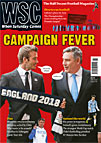 Steve Menary looks at the changing faces and new ideas in football's hierachy
Steve Menary looks at the changing faces and new ideas in football's hierachy
The shock departure of Ian Watmore after less than a year as FA chief executive rather overshadowed another change in the game’s executive merry-go-round. Shortly before Watmore’s sudden exit, Greg Clarke was confirmed as Football League chairman to replace Lord Mawhinney, who stepped down after seven years.
With a negligible football background, Mawhinney generated few expectations but under him the Football League introduced a number of innovations. Clarke’s experience in football is only marginally better with a brief spell as Leicester City chairman but he pledged: “The lessons learnt from that experience will not be forgotten.”
Leicester attempted to fund a promotion bid and construction of a new stadium at the same time. Discovering this was not possible, the club filed for administration in 2002 and left builders Birse out of pocket by £5.5 million. Soon after, Mawhinney introduced a points deduction for clubs going into administration.
“The Football League did trail blaze a bit with a number of things like [disclosing] agents’ fees,” says Football Supporters Federation (FSF) chair Malcolm Clarke. “But sporting sanctions was an idea that’s been and gone. It was needed to stop the likes of Leicester. Now we need more sophisticated financial instruments.”
The FSF welcomed a deal that allows the Football League to discuss clubs’ financial affairs with HM Revenue & Customs, which has brought half a dozen winding up orders against clubs this year. But the FSF wants more support on the issue of standing. Malcolm Clarke adds: “It’s quite clear that the current regulations [on standing] are not working. We would like to see the Football League come out of its shell and not be frightened of the government and the Football Licensing Authority.” After Greg Clarke’s £150,000 a year post was confirmed, he promised greater transparency. “Scrutiny keeps everyone honest,” he told the Independent. The question now is how far Clarke wants to take that scrutiny. As far, perhaps, as AFC Bournemouth, which earlier this year named all the companies and people that the club owe money to?
A League ruling that clubs must disclose agents’ fees was a welcome innovation but Bournemouth chairman Eddie Mitchell’s exercise in freedom of information over his side’s debts of £846,000 was a drastic step. Fans learned, for example, that local car suppliers Seward were among Bournemouth’s creditors. That surprised many who assumed that Seward – as a former club sponsor – had been putting money into the club. Instead, the club owed Seward nearly £20,000 for leasing cars.
“I’m all in favour of transparency but not sure this would be something which could work in a live sense,” says Dave Boyle, chief executive of Supporters Direct (SD), the government-backed group that helps fans take a stake in clubs. “The idea would presumably be that a sense of shame would prevent clubs from running up those debts in the first place, but I’d prefer more direct assaults on that problem than this.”
SD would like the League to adopt UEFA plans on financial fair play aimed at making clubs balance their books. Boyle adds: “I’d love to see it across domestic leagues but given the interconnectedness of leagues, it would have to be something monitored by the FA, rather than created by the League or Conference on their own. As the farrago regarding Chester City’s relegation showed, having rule books with different principles and policies creates a real problem.” What SD wants from Greg Clarke is the names of club owners to be published, the introduction of club licensing modelled on the Bundesliga (assessing the fitness of business plans and not just individuals running clubs) and proper cost controls exerted on all 72 League members.
Boyle also wants a supporters’ seat on the League board and a recommendation for the same at each club. But what both groups want is more support for the FA. That is something that Ian Watmore’s replacement would perhaps welcome more than anything else.
From WSC 279 May 2010